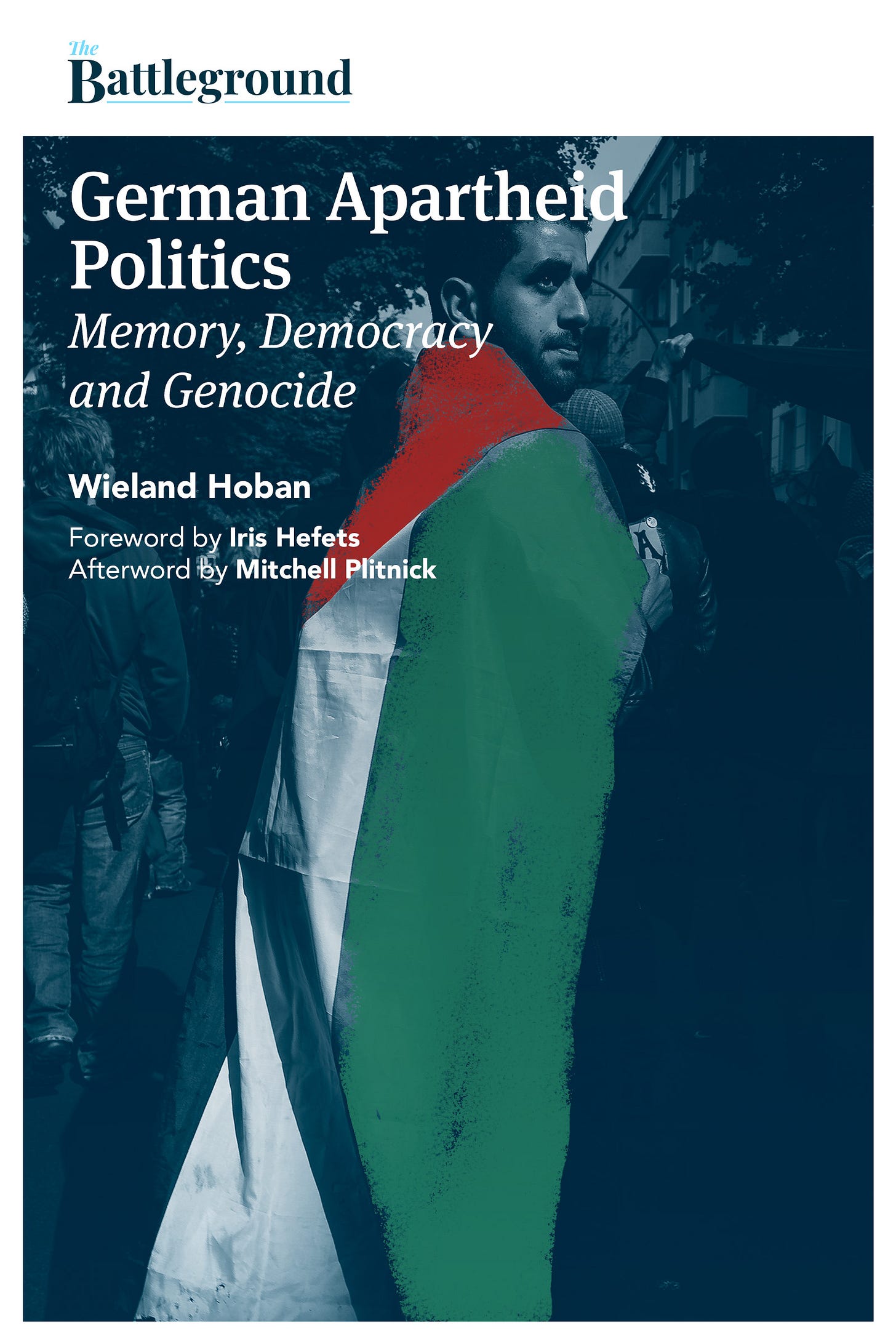No one denounces racism like Wieland Hoban. Best known for his translations of philosophers Theodor Adorno and Walter Benjamin into English, the Frankfurt-based Jewish composer and activist wears his work on his sleeve.
Incensed by the weaponisation of Antisemitism in German politics to discriminate against Palestinians, in 2020, Hoban began detailing his concerns in The Battleground.
Covering everything from non-Jewish officials attacking Jews for Antisemitism to interviewing Palestinian and Israeli expats about living with German racism, German Apartheid Politics is an eye-opener for those who believe the country purged itself of Nazism.
Nothing drives this home better than Hoban’s article on Germany’s Roma-Sinti community and how, to this day, it struggles with being recognised as an equal victim of the Nazi genocide.
Even at the European Union level, Wieland Hoban struggles to find something different from German Holocaust remembrance culture.
So pervasive are German efforts to lead the fight against Antisemitism that the EU Handbook for Fighting Antisemitism repeats everything wrong with its national approach across the bloc.
Criticising Israel is not Antisemitism. Yet, given the EU’s faltering approach to the Gaza war and its inability to adopt a unified approach, its German ideological leadership is partly to blame.
Wieland Hoban’s book is long overdue. A sign of the German Jewish community’s growth in recent years, particularly the immigration of progressive Israeli and Anglo Jews to the country, German Apartheid Politics is a statement of its time.
Though some Germans will give it a thumbs down, the book is a testimony to the German Jewish zeitgeist and what to expect from the country’s rapidly changing community in the future.
Advance Praise for German Apartheid Politics:
Wieland Hoban is a candle in the darkness of German discourse on Israel/Palestine. Every German should read him to understand how much more humanity, diversity, and integrity exists among Jews grappling with one of the great moral crises of our time.
– Nathan Thrall, journalist and researcher, author of A Day in the Life of Abed Salama (2024 Pulitzer Prize)
Wieland Hoban’s analysis of the horror that takes place in Palestine and Germany is desperately needed in a country where dissident opinions are not only censored but criminalised. His writing brings about a fresh perspective in Germany, where a pro-Israel bias dominates every major media outlet. Seldom do we see a clear analysis that gives us, the reader, insight on how in denial Germany is about the ongoing genocide in Gaza and even its own dark colonial history.
– Hebh Jamal, journalist and activist
Part ethnography, part journalism, Wieland Hoban’s observations of German memory politics are trenchant, perceptive, and timely. The chapters in German Apartheid Politics detail episodes in the making of liberal authoritarian culture, the existence of which much of the German political class either ignores or welcomes. The author’s critical Jewish perspective, which prizes pluralism and openness, is a necessary counterpoint to the politics of fear that drives so many actors in that troubled country. A welcome addition to the critical history of contemporary Germany.
– Dirk Moses, The City College of New York, author of The Problems of Genocide
Wieland Hoban’s essays interconnect multiple intersectional layers of anti-Palestinian oppression, spanning from Germany to Palestine. They not only expose settler colonialism and Germany’s repression of Palestinians but also serve as a call to resist the growing neofascism in Germany, particularly highlighting the complicity of the pro-colonial German left, such as the Antideutsch. Hoban’s contribution arrives like a meteor, signalling hope and the power of thought to many of us. German Apartheid Politics calls for collective liberation and the liberation of the Palestinian people.
– Majed Abusalama, researcher and activist
Wieland Hoban writes about Palestine with passion, honesty, and a deep commitment to justice. He explores, among other issues, the role and hypocrisy of the German state in its support for Israel and in its violent response to those protesting Israel’s genocide; his experience volunteering at a vibrant cultural festival in Palestine; radical perspectives on resistance; and what it means to be a supporter of Palestinian liberation. His analyses are smart, principled, and thoughtful and always sharpen my thinking and organising.
– Donna Nevel, activist, Jewish Voice for Peace
This book is an example of how minority rights, Muslims, Palestinians, Jews, Sinti and Roma, and LGBTQIA+ are protected. Not by reducing people to a common denominator, but by a sensitive investigation of what makes each of us unique and how racism and discrimination try to divide us. German Apartheid Politics is an uncompromising force for justice and equality, but also a show of empathy. Empathy which reaches beyond the comfort zone of those who are like us, but extends further to understand our oppressors. Without such empathy, we cannot hope to understand them and defeat them. Wieland Hoban teaches us a lesson in intersectional progressive activism and journalism, a must-read for everyone.
– Shir Hever, activist and economist, author of The Privatization of Israeli Security




